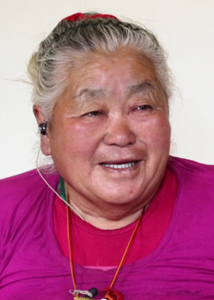Name: Dhondup Lhamo
(Alias: No)
Gender: Female
Interview Age: 71
Date of Birth: 1944
Birthplace: Lagong, Kham, Tibet
Year Left Tibet: 1974
Profession: Farming
Monk/Nun: No
Political Prisoner: No

Interview No.: 6N
Date: 2015-04-06
Language: Tibetan
Location: Kathmandu, Bagmati, Nepal
Categories: Chinese Invasion and Occupation
Keywords: childbirth, Chinese rule -- life under, commune system, escape experiences, Kham, refugee in India -- life as
Summary:
Dhondup Lhamo lived in a village called Lagong where the people farmed wheat, barley and medicinal plants under the commune system established by the Chinese. The harvested grains had to be given to the Chinese which led to a shortage of food grains for the farmers. Dhondup Lhamo and her husband, taking along their three children, fled to Lhasa in 1961-62 because they could not get enough food to feed the family.
Dhondup Lhamo describes life in Lhasa as a little better than in her hometown. She talks about how her family depended upon the kindness of other workers that provided them with tsampa 'flour made from roasted barley,' clothes and money. Dhondup Lhamo had six children, including twins, and explains how her husband helped her during all the births except one when she was forced to go to a hospital. Her husband worked in construction in Lhasa but she recalls being too sick to work herself.
Dhondup Lhamo hoped to find education and a better life for her children, so the family decided to escape to Nepal. Their journey from Lhasa was difficult with so many small children to carry. They travelled on foot and whenever lucky had short rides in vehicles. After reaching Nepal and receiving help from her husband's friends, her family proceeded to Dharamsala, India to see His Holiness the Dalai Lama and place the children in schools. Her husband received a job at a carpet factory in Dalhousie and their life was much improved.
Interview Team:
- Tenzin Yangchen (Interpreter)
- Katharine Davies Samway (Interviewer)
- Dhiraj Kafle (Videographer)

